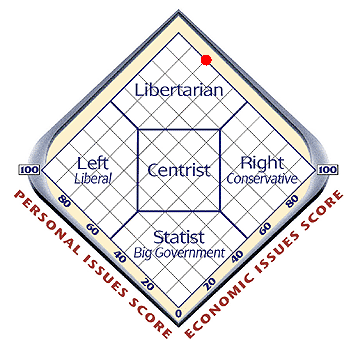Megan McArdle looks at a meme of which I’ve grown quite tired — that “real libertarians” didn’t support the war:
This is the emerging meme, mostly, interestingly, among people who are not themselves libertarians.Stand by for my post tomorrow: real progressives won’t vote for Hilary Clinton.
Real or not, there’s this test result. And there’s this chart.

The results I get don’t change much, and they’re based on my answers to questions. I think what I think, and I happen to agree with a lot of what most people would call “libertarian thinking.” Whenever I take these tests, they tell me that I am libertarian. Pointing that out does not morally obligate me to do anything beyond agreeing with my own answers. The tests do not tell me what I think, nor what I should think. I tell the tests what I think, and I think what I think I should think.
Is there anything in those tests or in my stated libertarianism which says I have to take an oath to be “real”?
What is real?
I find it appalling that anyone would tell anyone else that he is not a “real” libertarian. No one is in any position to do this, as there is no oath to take. Other than the Libertarian Party, there is no platform.
So who would have the right to determine what is, and what is not, the correct ideology?
As an individualist, I would not trust anyone who tried to claim such a right, because he’d be claiming a right to speak for me.
Unless libertarianism has become like scientology, I don’t think other libertarians have any such power.
I think that part of the reason I fall into the libertarian camp is because of my individualism. I don’t believe that anyone has the right to tell anyone else what to think. Telling someone he is not a “real” libertarian has no other purpose than attempting to bully him into thinking not what he thinks, but what the accuser thinks. This, I think, explains why most of the accusations that libertarians are not “real” seem to be coming not from libertarians, but from self-appointed antiwar scolds.
The “libertarian” handle for me is a label of convenience — something to help give people a general picture of my philosophical outlook which they can take or leave, but certainly not something worth fighting for. People can say I am not real, but unless they change the tests, I’m afraid the tests will go on saying I’m libertarianish, and I will too.
I don’t care whether I measure up to someone else’s standards of “realness.”
Life is too short.
Comments
6 responses to “generic label loyalty?”
I hear you, Eric. I hear the same sort of stuff all the time. How dare I call myself a libertarian, even a “small-L libertarian,” which is my chosen self-description.
I’m much less polite than you are, so I usually enjoy booting these boobs around as publicly as possible, but it does seem to me that the Libertarians are suffering from an influx of Bill Maher “libertarians” who really do confuse a pinkish sort of anarchy, or just plain libertinism with the sort of libertarianism I’ve been associated with for thirty years.
The party structure has always had a wing of Hoffer-style true believers (many of whom cluster around Reason Magazine these days), but they have never been, and are still not, the whole story of libertarianism in America.
It’s always legitimate to be curious what a word means, and the individual doesn’t get to control it, but only to investigate.
Often the political words take on doctrines, for which see Wm. Empson _The Structure of Complex Words_.
Libertarian, in “real liberatarian,” uses a double meaning, claiming that the libertarian narrowly considered (opposing the war) is the right handle to take hold of the broader meaning, the narrow half being brought in with “real” to call out some distinction, which will be supplied nearby.
But even the propagandist isn’t free to make the word go just anywhere. It needs some support in the language already, which is where the individual has no part to play but to investigate.
I would say that a sane libertarian knows his freedom games can only be played within the context of a national sovereignty, and that undermining his nation’s efforts in wartime is rarely called for.
This isn’t one of those times.
I find it appalling that anyone would tell anyone else that he is not a “real” libertarian.
What about the self-appellated “socialist libertarians?” Seems oxymoronic. I mean minarchism isn’t quite the sine qua non of libertarianism, but it’s close.
I could never figure out how someone who thinks (like I do) that liberty is in serious jeopardy in America can also believe that someone living in Saddam’s Iraq should buck up and just deal with it, because it isn’t important enough for us to fight for.
It seems that a lot of “real” libertarians think that liberty is an American right, not a human right.
I disagree. Don’t most libertarians agree with some sort of truth-in-advertising law? That is, one cannot represent something as something else.
If I were to call myself a “libertarian” because I believe that I have free will (as opposed to others who would say that my actions are determined), shouldn’t I modify or preface my description so as not to confuse it with political libertarians?
I would think libertarians would be particularly concerned about “protecting their brand” because they have already been driven out of one perfectly good description: liberal, which pretty much used to mean what economic libertarian means today, or at least, it did in the context of the time. Now, of course, liberal means something much different, so it can be confusing to call Lock or Adam Smith a liberal, but that is what they would have been called by contemporaries. Liberals lost control of their own label and libertarian had to be invented.